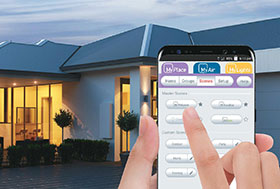

Nowadays, both industrial and commercial infrastructure is being outfitted with IoT technology, powered by Power over Ethernet (PoE). With that said, it’s no surprise that residential infrastructure is next. Devices like Google Home and Amazon Alexa are becoming commonplace in the average American household. These devices can be used to – with the proper smart home network configuration – control HVAC, lighting, door locks, windows, music, and more. The future of smart homes looks like it will only continue to grow in popularity, which means the way we live our day to day lives is about to change drastically.
Advancements in smart home technology
Technology is advancing at an exponential rate, and smart home technology is no exception. Here are a few predictions of the future of smart homes with technology fuelled by PoE and the IoT:
1. Artificial intelligence
Smart homes will be able to track your location inside of a home, either via an electronic pin that you wear on your clothes or electronic sensors inside of the home. The house will know who and where you are, and it will use this information to accommodate and even anticipate your needs.
This positioning technology is already being used in Bill Gates’ home and is sure to make its way to the mainstream consumer market in the near future. The house will be able to adjust everything from heating and cooling to music and lighting, all based on the person who walks in the door.
2. Smart lighting
Smart lighting, powered and controlled by PoE, is going to revolutionise the way we illuminate our homes. Smart lighting automatically adjusts itself by detecting the presence of an occupant in the room – when the occupant exits, the lights will either dim or shut off entirely.
There are a plethora of applications for this technology. For example, pressure sensors can turn off the lights when you’re lying in your bed after a certain time. If, for example, you wake up in the middle of the night to use the bathroom, the lights will turn on so you can find your way. Once you’re ready for bed again they’ll turn off once again.
Nobody likes being blinded by bright lights in the middle of the night. You can control the brightness of your lights so they won’t be too bright when they turn on in the middle of the night. Your smart home will remember your configuration so you can tailor every device in your home to your liking.
Sub header: 3. Smart locks
Comparatively to smart lighting, smart locks can be programmed according to your needs. Visitors can be granted or denied access based on specified identifiers. Amazon Key is a fantastic example of this technology, which grants Amazon’s authorised shippers access to prime members’ homes or post office boxes.
Repairmen can be granted access to the house with a special authorisation code, whereas unknown intruders won’t be allowed in.
4. Home monitoring
When people leave for vacation, most ask their neighbours to keep an eye on their home for them while they’re away.
What if there was a way for the house to monitor itself?
Smart security systems can autonomously monitor the house, and report any unprecedented incidents to the homeowner and, if necessary, emergency services.
In addition, smart homes can monitor elderly people living on their own. Those who would otherwise be fine living on their own will have an extra helping hand to aid them, reminding them to take their medication, and make sure day-to-day tasks are completed successfully and safely. In case anything happens – such as an unexpected fall – emergency services can be notified and automatically allowed inside to help.
Issues with integration
There definitely isn’t a shortage of IoT devices – in a recent presentation, Samsung’s CEO announced that by the end of 2020, 100% of its products will be IoT enabled.
However, without an affordable, mainstream way to interconnect all of these devices, widespread smart home technology is still hard and expensive to achieve. Voice-controlled temperature, lighting, appliances, etc. are great, but they all need to be controlled separately at the moment. Until there is an affordable, easy way to integrate a central control system, mainstream smart homes in the consumer market are still a ways away.
Security is another big concern. As houses are filled with cameras, sensors, voice-activated control systems, and data tracking AI, our privacy is being lost entirely. It’s not a question of if, but when these devices will become compromised. Companies can use the data to target us with even more personalised advertisements, and governments will be able to collect the data gathered in our own homes.

© Technews Publishing (Pty) Ltd. | All Rights Reserved.